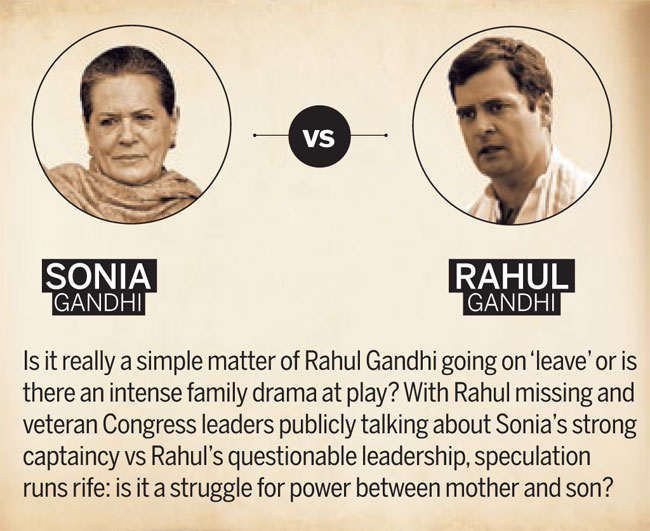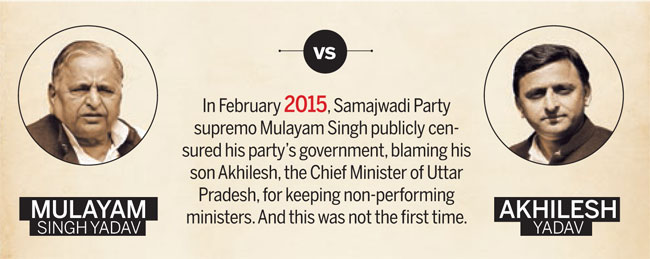Political families, India
This is a collection of articles archived for the excellence of their content. |
Political dynasties: the pluses, minuses
2016: an NYU study

The Times of India, Aug 07 2016
New studies on India's political dynasties busts many assumptions
The Nehru-Gandhis, the Badals, the Abdullahs, the Yadavs, the Scindias -what is it about India's political soil that lets so many family trees thrive?
It's because of a lingering feudalism, say some. It is because of our easy acceptance of hereditary occupations, say others.
But though dynasties in India have been described in history and biography , the phenomenon has never been empirically analysed. A new set of data-driven and theoretically ambitious studies, led by New York University political scientist Kanchan Chandra, is the first to actually study how dynasty and democracy interact. Their book, `Democratic Dynasties: State, Party and Family in Contemporary Indian Politics', has put the skids under much of our popular wisdom.
Dynasty is a paradox, it both hurts and furthers democracy
Dynasties, as we instinctively know, are a violation of political equality because they create entry barriers to outsiders.The data shows that across parties, dynasty logic entrenches forward caste privilege. And yet, they also have collateral benefits that deepen democracy , by opening avenues for women, young people, Muslims and other social groups who don't have an easy way up our given political structures. It is not an ideal route, but dynasties seem to have worked like quotas for the representation of these groups, suggests Chandra.
Party and state set-ups, not feudal charisma encourages dynasties
Indian dynasties are a product of its democracy; former royals and feudal notables account for barely 3% across the last three Lok Sabhas. The Scindias are, in fact, an exception in how they adapted to electoral politics.Voters do not particularly favour dynasts, and they themselves frame their electoral appeals in modern terms, to convey credibility and service rather than entitlement. Also, contrary to popular fears, families do not maintain a tight grip over a constituency; only 5% of parliamentary constituen cies have been continuously represented by a dynastic MP between 2004 and 2014.Dynastic and non-dynastic MPs often switch places in the same constituencies.
So what drives the forming and strengthening of dynasties? Two things, says Chandra -the fact that political office is more attractive than ever before, and the organisational weakness of parties (the lack of clear rules in ticket al location and the assurance of loy alty in sticking with a family member). This is why, even leaders stub bornly resis tant to dynasty like Mamata Banerjee, for instance -can end up allowing it.
Dynasties are pervasive around the world; India isn't unique or extreme
With dynasts occupying 20% of the 2004 Lok Sabha, 30% of the 2009 Lok Sabha and 22% of the 2014 one, India is definitely among the more dynasty-loving nations, but it is in the same league as Japan, Iceland or Ireland, where between a third and a fourth of the legislators had helpful family connections. It is much less dynastic than the Philippines, for instance, where dynasties account for a full 50%. Countries on the lower end are Belgium, Israel, and the US, with 6 to 11%, and Canada where only 3% of the legislators were dynasts. Of course, some nations have institutionalised space for ruling families and aristocrats, like the UK, Sweden, Thailand, Zambia and so on.
Discords/ tiffs
... in 10 political families/ 1911-2015
India Today April 27, 2015
Damayanti Datta
10 political family tiffs that have often turned ugly
A look at slugfests in political families that often turned disturbing
As the Gandhi vs Gandhi clamour hots up in Congress, a look at slugfests in political families that often turned disturbing.
INC President Sonia Gandhi vs son Rahul GandhI
See graphic/ this is about Mr Rahul Gandhi's sudden, unexplained 'leave' of absence in 2015.
Mahatma Gandhi vs eldest son Harilal Mohandas Gandhi
See graphic.
Indira Gandhi's husband Feroze Gandhi vs Jawaharlal Nehru
See graphic.
Indira Gandhi vs Maneka Gandhi
See graphic.
Samajwadi Party chief Mulayam Singh Yadav vs son and Uttar Pradesh CM Akhilesh Yadav
See graphic.
See also Samajwadi Party
Former PM H.D. Deve Gowda vs younger son H.D. Kumaraswamy
See graphic.
Madhavrao Scindia vs mother Vijayaraje Scindia
See graphic.
Shiv Sena founder Balasaheb Thackeray vs nephew Raj Thackeray
See graphic.
DMK chief M. Karunanidhi vs elder son M.K. Alagiri
See graphic.
Leader of the People's Party of Punjab, Manpreet Singh Badal vs uncle Parkash Singh Badal
See graphic.
1984-2016
NETA FAMILY FEUDS, Oct 25 2016 : The Times of India
Yadavs are the latest in the list of political families facing a split as generations clash over way ahead for the party & roles they play
AIADMK
I n 1984, when MG Ramachandran was incapacitated after a stroke, Jayalalithaa reportedly tried to take over the position of CM. After MGR's death in Dec 1987, AIADMK split into two factions between Janaki (MGR's wife) and Jayalalithaa.Following AIADMK's rout in the 1989 state polls, the faction led by Janaki merged under that led by Jayalalithaa
TDP
In 1995, Chandrababu Naidu staged a coup against party founder NT Rama Rao, replacing him as Andhra's CM. Naidu would later say a “dushta shakti“ (referring to NTR's second wife Lakshmi Parvati) tried to destroy the party and to protect it from the “evil force“ he had to revolt and split TDP. Members of the NTR family supported Naidu. After NTR died of a heart attack in Jan 1996, Parvati floated a rival faction TDP NTR. Both Naidu and she staked claim to NTR's legacy
DMK
Hints from party supremo Karunanidhi that his younger son MK Stalin was to be his political heir sparked tension in the DMK first family as MK Alagiri, Stalin's elder brother, openly vented his ire and accused his father of being “partial“ to his younger brother.
Alagiri was eventually expelled from DMK in 2014 for engaging in “anti party“ activities
Shiv Sena
Raj Thackeray resigned from his uncle Bal Thackeray's party in 2006 and went on to form the Maharashtra Navnirman Sena. He had complained about being sidelined in the party and said “all I had asked for was respect (from `Matoshree', the Bandra residence of Thackeray and his son, Uddhav).All I got was insult and humiliation“







